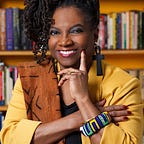Randall Robinson, 1941–2023: What’s the Word?!
By Nkechi Taifa
I believe Randall Robinson, who died this past Friday, was born to straddle the Black professional and grassroots communities.
I saw it early on in my life. Robinson formed TransAfrica during the time I was working for the Washington Office on Africa (WOA) while attending the George Washington University Law School at night. That time, the early 1980s, was tough because Ronald Reagan’s 1980 election signaled a sharp stop to many of the gains the progressive movement, particularly the Black progressive Left, had fought for since the 1954 Brown vs. Board of Education decision.
Serious interracial coalitions were built to fight Reagan’s policies and a conservative State Department that openly defended white supremacists around the world, including the African continent. My first non-African-centered job out of Howard undergrad as a young Black radical and aspiring lawyer, was working for a predominately white organization that had funding and institutional backing. WOA, although at the time led by a badass dynamic Black woman, the now-ancestor Dr. Jean Sindab, while advocating for a progressive U.S. policy towards Southern Africa, was nevertheless a white-dominated church and union-sponsored organization, with minimal roots in Black communities.
But the African/Caribbean lobby group TransAfrica, however, organized and led by Robinson — a 1970 graduate of Harvard Law School whose brother, Max, was the first Black evening network news anchorman in American television — garnered instant legitimacy in the Black community, both professional and grassroots.
Those of us in the Black Power movement had been fighting for a free Caribbean and a free South Africa for decades. We cheered when Black South African students rose up in Soweto in 1976, rejecting white colonial education. We had rallies and played Gil Scott-Heron and Brian Jackson’s song, What’s the Word, “Johannesburg,” which was about their struggle and our struggle. (“They tell me that our brothers over there/ Refuse to work in the mines, sometimes/ They may not get the news but they need to know/We’re on their side”) We held community screenings of Last Grave at Dimbaza, a 1974 film about how apartheid was choking the Africans there of their very spirits. We devoured the few books available on Nelson and Winnie Mandela, which back then were controversial acts because the Mandelas were considered terrorists in both U.S.A.s (the Union of South Africa and the United States of America).
When Robinson and others in 1984 began to protest outside the South African embassy on Embassy Row in Washington, D.C. (around the same time South African Bishop Desmond Tutu was getting a Nobel Peace prize), he was joining our side. But to the news media, he had dramatized — and, therefore, mainstreamed — a large international human rights campaign to free African National Congress leaders Nelson Mandela, Walter Sisulu, Thabo Mbeki and others. I likewise joined in the mass arrests.
One of my fondest memories of Robinson was his launch of a national campaign and coalition, Artists and Athletes Against Apartheid under the leadership of Arthur Ashe and Harry Belafonte. South Africa was offering as much as $2 million to artists to travel to the country to perform. Robinson’s new campaign was designed to inform the U.S. entertainment industry about the U.N.-sanctioned ban on tours of South Africa and was instrumental in elevating the cultural boycott against South Africa. This act, as well as the release of the 1985 anti-apartheid album Sun City, whose title song was about popular singers saying no to South Africa, showed there was no separation between culture and politics.
Robinson was at the center of history-in-the-making as part of a pivotal moment in the creation of a momentous world chronicle — the dawning of a free Southern Africa. His struggle for a democratic Haiti took a dramatic turn in 1994, when he promised to fast until death or until President Clinton assisted the island and stopped sending refugees back there to die. Clinton caved. I wish I could tell you how much I remembered that time and that I likewise fasted for justice, but I was busy giving birth that April.
Just as he was at the epicenter of the dawning of a free South Africa and for democracy in Haiti, Robinson also was instrumental in elevating the issue of reparations amongst moderate Blacks such as Dorothy Height, while the National Coalition of Blacks for Reparations in America (N’COBRA) was galvanizing the grassroots. His 2000 groundbreaking book, The Debt: What America Owes to Blacks, published fourteen years before Ta-Nehisi Coates’ treatise in The Atlantic magazine, “The Case for Reparations,” and twenty years before the murder of George Floyd, was the first to catapult the issue into the white policy arena.
Robinson may have later written a book called Quitting America, but he really didn’t. Yes, he lived in St. Kitts, where his wife Hazel was a native — as were my maternal grandparents who came to America around the turn of the 20th century — but he also taught at the Penn State Law School for years after that book.
We loved and respected Robinson because he had the strength to publicly confront the West’s amnesia — its total collective denial of centuries of racism and white supremacy. He sought to expose the United States and France as the tyrants of late 20th/early 21th century Black people in South Africa and Haiti, and put ink to paper calling for what we today call reparatory justice.
With today’s book bannings and Black history-erasing sweeping the nation, it is critical that Randall Robinson’s real, radical views about America, Africa and the Caribbean are not buried under multitudes of obituary words.
#####
Nkechi Taifa is a civil and human rights attorney, activist, and author of the best-seller books, Reparations on Fire: How and Why it’s Spreading Across America, and Black Power, Black Lawyer: My Audacious Quest for Justice
